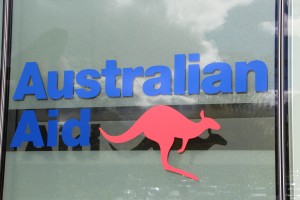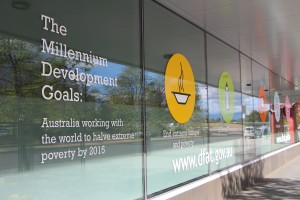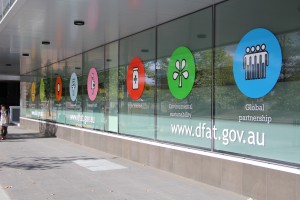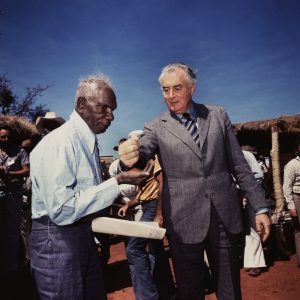Should Australian Aid be lending a helping hand to Vanuatu?

Vanuatu was devastated last month by Tropical Cyclone Pam, but fortunately the island nation has received assistance from organisations the world over, including Oxfam, UNICEF, and the Red Cross.
However, the reaction of the Australian Government has left many underwhelmed. A week after the cyclone hit Vanuatu on March 16, Australian Foreign Minister Julie Bishop committed $10 million of aid in the form of defence personnel, food and other supplies.
According to former Director General of AusAid, Bob Dun, this amount is not enough for Australia to be providing comprehensive assistance to Vanuatu.
“What would you do with that? It’s nothing! That’s downright embarrassing.”
The size of the amount is hardly a surprise to most people, after the Federal Government announced in the 2014 budget that they would be cutting $7.6 billion out of the Australian Aid program over five years.
Despite claiming on the Department of Foreign Affairs website that “Australia is an important economic partner for Vanuatu”, the islands haven’t been spared from the cuts.
Australia’s annual assistance to the South Pacific Island chain decreased from $60.7 million in 2013/2014 to $60.4 million in 2014/2015.
These cuts don’t help Australia to meet their commitments to the global community, namely the Development Assistance Committee’s (DAC) Organisation for Economic Co-operation and Development (OECD).

However, Dun explained why the government was so willing to make such big cuts to the aid program so early on in their term, despite losing a little of their international face.
“There’s no votes in aid,” he said.
“Just recently it was leaked that they were going take more out of aid. Which again they could do, it wouldn’t cost them much in votes. But Julie Bishop, the Foreign Minister, stood up to them over it quite brutally and she got them to back down.”
Bishop’s public stand against the government has been applauded by the humanitarian facets of Australia, but Dun said there was far more to it than Bishop feeling charitable.
“This is a typical thing that happens with aid. They think they can cut it and get away with it – there’s no votes in it, and that’s right, but as soon as Prime Ministers and Foreign Ministers come in, in a new government, they wake up within five minutes that they’ve got to have aid,” he said.
“If they’re going to function internationally, they can’t do without it.”
Dun said that Australia quite often takes a grilling in international forums like the OECD, having not met their aid target of 0.7% of their GDP.
“Since the aid level high in Whitlam’s time our funding performance has been going steadily backwards. In the 80s I had to front up in Paris and say ‘it was only a slight step backwards.’ ‘We’ll be up there with the 0.7’, which is a laugh,” he said.
“In basic terms you could say Australia was a mean country.”
By the 2016/2017 budget, it’s estimated this level will have dropped to 0.22%.
If this were to happen it could have drastic consequences for Pacific Island countries like Vanuatu, who rely heavily on annual installments of international, and particularly Australian, aid.
“They really need it. Basically they’ve got no industries other than tourism and tuna. There’s almost nothing they can do,” he said.
“The longer you can keep them afloat and viable the better.”
Dun spent time living and working in the Pacific Islands after retiring from AusAid. He took up a post with the South Pacific Commission for four years as their Director-General.
He said the Pacific was in trouble, and that the Utopian paradise holidaymakers imagine is quite some distance from the reality.
“In the way that people think about the Pacific, you think of an idyllic lifestyle with sea, sand, beautiful islands and happy people. It’s sort of a dream that people often have in regard to island cultures, and when you go there, you’ll find, mostly, that it’s so far from that that it isn’t funny,” he said.
“When you go there you can sometimes feel as if you’re in a slum. Australia is involved with providing aid there and it really is quite a challenge. The future of those people in those little countries is really hard to see.”

However, this has its complications, which are exacerbated by the cultural differences between these smaller struggling Pacific nations and a larger, developed country like Australia.
“Australia to an extent is always thought of as big brother, and is never popular. To be popular there you’ve got to work at it. Whereas the Kiwis are seen as part of the place. Australia is seen as a big Western Union that’s trying to boss them around. We worked really hard to try and undo that,” Dun explained.
“Whereas the Kiwis, they’re islanders, and they’re sort of welcomed as brothers, even though they give less than Australia.”
If it’s such hard work, why then does Australia apply itself to the task of providing support to these much smaller, less economically stable countries?
“Take a little country like Tuvalu with about 10000 people. It’s as big as one of the hang on settlements for Canberra. What can they do? They can’t do anything. But they’re a country and they have a vote,” Dun said.
“Why the little countries matter, is that their votes are important for all sorts of things. There’s a heap of votes there, each country has a vote.”
These votes, particularly in the United Nations are hot property, and can make all the difference in global decision making.
“They put the countries up against each other. Taiwan and China for example. Say Solomon Islands gets money from Taiwan for their fisheries. You’ll find that China will immediately balance that.”
Dun’s experience also lead him to find that these international relationships were often leant on by partners and favours were exchanged, largely through the resources provided by various aid programs.
“You’ll find a lot of push from within the aid program from Australia’s key partners. For example, America, which has huge influence on Australia, they look to Australia to look after the South Pacific,” he said.
“Essentially that’s what Australia tries to do. These little countries are a huge priority.”
While on the face of the issue it may appear a waste of time and money to be attempting to transform these tiny nations, but in reality it seems that there is an underpinning element of giving and receiving in our aid transactions.
There’s a lot more to it than just loving thy neighbour.




Be the first to comment!